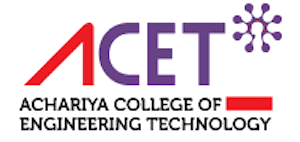ABOUT
The Academic Council and Curriculum Committee are integral components within educational institutions, responsible for overseeing and shaping the academic landscape of the institution. These bodies play crucial roles in Ensuring the Quality, Relevance, and Effectiveness of the Curriculum and Academic policies.
The Academic Council typically comprises esteemed faculty members, academic administrators, and sometimes representatives from relevant stakeholders such as students and Industry experts. Its primary function is to formulate and review Academic policies, establish academic standards, and approve major academic initiatives. This council serves as a forum for discussing matters related to Teaching, Learning, Research, and Student welfare. It often collaborates with other administrative bodies to ensure coherence and alignment with the institution’s mission and vision.
OBJECTIVES
- To review programmes and courses in a systematic manner on a regular basis.
- To ensure whether curricula is current and relevant to the programmes.
- To initiate new academic courses and programmes.
- To bring about innovations in teaching, learning and evaluation.
- To address issues and challenges in relation to teaching and learning.
- To monitor and initiate measures to enhance academic quality.
- To schedule Board of studies, meet for revision of syllabi as per university norms.
- To establish a system of function in college by scheduled responsibilities to all the departments, adhere to the schedule as planned in the annual meeting, planning the academic calendar according to the needs of the students, in terms of curricular, co-curricular, extracurricular activities, and to plan the activities based on the needs of the student’s society.
Academic Council
- Policy Formulation: Develop and review academic policies and regulations governing areas such as admissions, grading, academic integrity, and student conduct.
- Curriculum Oversight: Provide oversight and approval for the development, revision, and evaluation of academic programs, majors, minors, and courses.
- Program Accreditation: Ensure that academic programs meet accreditation standards set by relevant accrediting bodies, and oversee the accreditation process when applicable.
- Faculty Appointment and Promotion: Establish criteria and procedures for the recruitment, appointment, evaluation, promotion, and tenure of faculty members.
- Academic Standards: Set and maintain academic standards and benchmarks for student achievement, ensuring rigor and quality across programs and disciplines.
- Budgetary Oversight: Review and allocate resources for academic initiatives, faculty development, research activities, and student support services.
- Student Appeals and Grievances: Serve as a final authority for resolving academic appeals, grievances, and disputes brought forth by students or faculty members.
- Collaboration and Liaison: Collaborate with other institutional bodies such as the administration, faculty senate, student government, and external stakeholders to promote academic excellence and institutional goals.
Curriculum Committee
- Curriculum Development: Develop and revise curriculum frameworks, learning objectives, and course content to ensure alignment with academic standards, industry trends, and student needs.
- Course Approval: Review proposals for new courses, course modifications, and course deletions, ensuring coherence and relevance within academic programs.
- Program Evaluation: Regularly assess and evaluate academic programs to identify areas for improvement, address emerging needs, and maintain program effectiveness.
- Assessment and Evaluation: Establish mechanisms for assessing student learning outcomes, program effectiveness, and instructional quality, and utilize assessment data to inform curriculum decisions.
- Interdisciplinary Collaboration: Facilitate interdisciplinary collaboration and integration of curricular offerings across departments and programs to foster interdisciplinary learning and research opportunities.
- Educational Innovation: Promote innovation in teaching and learning methodologies, instructional technologies, and pedagogical approaches to enhance student engagement and success.
- Compliance and Accreditation: Ensure that academic programs adhere to accreditation standards and regulatory requirements set by accrediting bodies and governmental agencies.
- Student advising and Support: Provide guidance and support to students regarding course selection, academic planning, and degree requirements, fostering academic success and timely graduation.
Academic Council and Curriculum Committee Members
| S. No | Name | Position | Category | Department |
| 1 | Dr. S. GURULINGAM | PRINCIPAL | HEAD | |
| 2 | Dr.A. KANNAKI@VASANTHAAZHAGU | Associate Professor/HEAD | Convener | CSE |
| 3 | Mr. F.D. ANFINSTON | HOD/CSE | Secretary | ECE |
| 4 | Mr. S. RAJENDARA PRASAD | HOD/CIVIL | Member | CIVIL |
| 5 | Mr. V. ANANDHAKUMAR | HOD/EEE | Member | EEE |
| 6 | Dr. G. ANAND | HOD/MECH | Member | MECH |
| 7 | Mrs.S.SHYMALA GOWRIE | HOD/S&H | Member | S&H |
| 8 | Mrs. RAJALAKSHMI.S | HOD/AI&DS | Member | AI&DS |
| 9 | Mrs. V. VIJAYALAKSHMI | Assistant Professor | Coordinator | ECE |
| 10 | Mrs. S. VIJAYALAKSHMI | Assistant Professor | Coordinator | CSE |
| 11 | Mrs. AMSALEGA | Assistant Professor | Coordinator | CIVIL |
| 12 | Mrs.S.KALAITCHELVI | Assistant Professor | Coordinator | AI&DS |
| 13 | Mr.S.ANBUSEZHIAN | Assistant Professor | Coordinator | MECH |
| 14 | Mrs.S.THAMIZHARASII | Assistant Professor | Coordinator | EEE |
| 15 | Mr. V. Arun | Assistant Professor | Coordinator | S&H |


